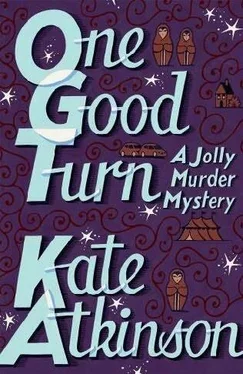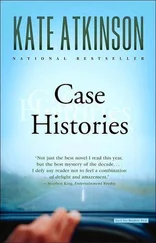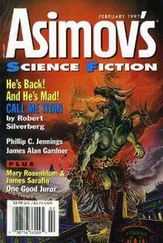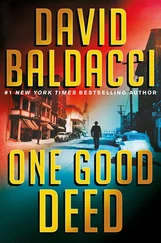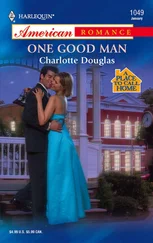Kate Atkinson - One Good Turn
Здесь есть возможность читать онлайн «Kate Atkinson - One Good Turn» весь текст электронной книги совершенно бесплатно (целиком полную версию без сокращений). В некоторых случаях можно слушать аудио, скачать через торрент в формате fb2 и присутствует краткое содержание. Жанр: Триллер, на английском языке. Описание произведения, (предисловие) а так же отзывы посетителей доступны на портале библиотеки ЛибКат.
- Название:One Good Turn
- Автор:
- Жанр:
- Год:неизвестен
- ISBN:нет данных
- Рейтинг книги:4 / 5. Голосов: 2
-
Избранное:Добавить в избранное
- Отзывы:
-
Ваша оценка:
- 80
- 1
- 2
- 3
- 4
- 5
One Good Turn: краткое содержание, описание и аннотация
Предлагаем к чтению аннотацию, описание, краткое содержание или предисловие (зависит от того, что написал сам автор книги «One Good Turn»). Если вы не нашли необходимую информацию о книге — напишите в комментариях, мы постараемся отыскать её.
One Good Turn — читать онлайн бесплатно полную книгу (весь текст) целиком
Ниже представлен текст книги, разбитый по страницам. Система сохранения места последней прочитанной страницы, позволяет с удобством читать онлайн бесплатно книгу «One Good Turn», без необходимости каждый раз заново искать на чём Вы остановились. Поставьте закладку, и сможете в любой момент перейти на страницу, на которой закончили чтение.
Интервал:
Закладка:
The criminologist lived, in fact, in Edinburgh, and Nina had just been to visit him in his house near the Botanics. She was currently on page one hundred fifty, on her way back to the Black Isle, hanging from the Forth Bridge while the Edinburgh-to-Dundee train “thundered like a dragon” above her. Did dragons thunder? “Well, Bertie, this is quite a scrape we’ve got ourselves into here, isn’t it? Thank goodness that wasn’t the King’s Cross-to-Inverness express train, that’s all I can say!” From his living room there drifted the scent of offal. Was Richard still in there? Martin twitched, he found his left hand was shaking. No, no, Superintendent Camp-bell reassured him, the body had already been removed to the po-lice mortuary. The house had been polluted by the living Richard Mott, and now it was being polluted by the dead one. There was no reality, he reminded himself, only the nanosecond, the atom of a breath. A breath that was scented like a butcher shop. He was glad now that he had eaten neither breakfast nor lunch.
“How did he die?” Did he really want to know?
“We’re still waiting for the results of the autopsy, Mr. Canning.”
Martin was waiting for the right moment to say, “I’ve just spent a drugged night in a hotel with a man who had a gun,” but Camp-bell kept asking him if he could tell if there was “anything missing”from the house. The only thing Martin could think of was his watch, but that had disappeared the day before yesterday.
“A Rolex,” he said, and the detective raised an eyebrow and said, “An eighteen-carat oyster Yacht-Master? Like the one that Mr. Mott was wearing?”
“Was he? Do you think Richard was killed in the course of a burglary that went wrong? Did someone break in thinking the house was empty [because I was spending a drugged night in a hotel with a man who had a gun] and Richard came downstairs and took him by surprise?” Martin could hear himself talking like a Crime-watch presenter. He tried to stop, but it seemed he couldn’t. “Did he disturb an intruder?”
“It has all the hallmarks of an opportunistic crime,” Campbell said cautiously, “a burglar surprised in the act, as you say, but we’re keeping an open mind. And there was no break-in. Mr. Mott ei-ther opened the door to his killer or brought him home with him. We estimate his time of death to have been somewhere between four and seven o’clock this morning.”
A uniformed policewoman passed them on the stairs. There were strangers everywhere in his house. He felt like a stranger himself. The policewoman was carrying a large plastic box that reminded Martin of a bread bin. She was holding it carefully away from her body as if it contained something dangerous or delicate. “Crossing on the stairs,” she said cheerfully to her superintendent, “that’s bad luck. And all those broken mirrors downstairs,” she added, shaking her head and laughing. Campbell frowned at her levity.
“We haven’t found the murder weapon,” he said to Martin. “We need to know if there’s anything missing from the house that might have been used to kill Mr. Mott.”
It seemed ridiculous to be using words such as “weapon” and “kill” in his lovely Merchiston house. They were words that belonged in Nina Riley’s lexicon. “So you see, Bertie, the murder weapon that killed the laird was actually an icicle taken from the overhang on the dovecote.The murderer simply threw it in the kitchen stove once he had used it-that’s why the police have been unable to find it.” He sus-pected he had stolen this plot device from Agatha Christie. But didn’t they say there was nothing new under the sun?
“We can’t discount the fact that this might have been personal, Martin.” Martin wondered at what point he had segued from “sir” into “Martin.”
“You mean that someone came here intending to kill Richard?” Martin said. Martin could understand that, Richard could provoke you into murderous thoughts.
“Well, that, certainly,” Campbell said, “but I was thinking about you. Do you have any enemies, Martin? Is there anyone who might want to kill you? ”
A miasma of Usher-like doom seemed to suddenly rise up and fold itself around the house like a wet shroud. Death had stalked its rooms. He had a terrible headache. Death had found him. It may not have taken him, but it had found him. And it was coming to exact retribution.
Robert Campbell escorted Martin to “his friend’s room.” Martin wanted to say, “He’s not my friend,” but that seemed cruel and heartless, considering what had happened.
Martin hadn’t been in the room since he had first shown Richard into it, saying, “If there’s anything you want, just say.” Then, it had been the “guest room,” with a pretty blue-and-white toile de Jouy on the walls, a cream carpet on the floor, and a neat pyramid of white guest towels on the French sleigh bed, with a copestone of Crabtree and Evelyn’s lily-of-the-valley soap. ( “Are you always this anal, Martin?” Richard Mott laughed when he walked in the room. “Yes,” Martin said.)
Now the guest room was like a doss-house. It smelled ripe, as if Richard had been eating takeaways-and, indeed, beneath the bed there was a pizza box that still contained a slice of old, cold pepperoni pizza and a foil container of something possibly Chinese, along with plates and saucers full of cigarette butts. The floor was littered with balled-up dirty socks, underpants, used tissues (God knows what was on them), all kinds of bits of paper that were scribbled on, a couple of porn mags. “He wasn’t the tidy sort,” Martin said.
“Is there anything missing from this room, do you think, Martin?”
“I’m sorry, I can’t really tell.” Richard Mott was missing, but that seemed like stating the obvious.
A police constable was rifling through a plastic carrier bag full of correspondence. “Sir?” he said to Robert Campbell, handing him a letter that he held gingerly by one corner in his gloved hand. Robert Campbell read it with a frown and asked Martin, “Did anyone have a grudge against Mr. Mott?”
“Well, he got a lot of fan mail,” Martin said.
“Fan mail? What kind of fan mail?”
“‘Richard Mott, you’re a wanking wanker.’That kind.”
“And was he?” Robert Campbell asked.
“Yes.”
“Can I ask you where you were last night, Martin?” Campbell asked, his broad, friendly features betraying no indication that he held Martin responsible in any way for what had happened in his house, to his “friend.” He sighed, a great deep sigh, the kind a very sad horse might give, while he waited for Martin’s reply.
Martin felt a burning pain, like indigestion, beneath his rib cage. He recognized it as guilt even though he was innocent. Of this, at least. But did it matter? Guilt was guilt. It had to be assigned somewhere. Paid for somehow. If there was cosmic justice at work, and Martin was inclined to think there was, then at the end of the day the weights had to balance. An eye for an eye.
“Last night?” Campbell prompted.
“Well,” Martin said, “there was a man with a baseball bat.” It sounded like the beginning of a story that could go anywhere- and he was a champion player in the major league . Or sad- and when he found out that he was dying, he willed the bat to his favorite grandson .The shape that the real tale had taken seemed unbelievable in compar-ison to its fictional alternatives. In the end Martin didn’t mention the gun, he could see it might be considered a detail too far.
26
Bill, the gardener, appeared like an apparition at the French windows, giving Gloria a start. It had begun to spit with rain out-side, but Bill never seemed to notice the weather. Whenever Gloria commented on it, “Isn’t it a lovely morning?” or “Goodness, it’s cold today,” and so on, he would glance around with a perplexed expression on his face, as if he were trying to see something invisible. It seemed an odd trait in a gardener, surely the weather should be part of his nature? She offered him coffee, as usual, although he had never in five years accepted. Bill always brought a khaki canvas satchel in which he carried an old-fashioned thermos flask and various greaseproof paper packets of food-sandwiches, Gloria supposed, and cake, perhaps a hard-boiled egg, all prepared by his wife.
Читать дальшеИнтервал:
Закладка:
Похожие книги на «One Good Turn»
Представляем Вашему вниманию похожие книги на «One Good Turn» списком для выбора. Мы отобрали схожую по названию и смыслу литературу в надежде предоставить читателям больше вариантов отыскать новые, интересные, ещё непрочитанные произведения.
Обсуждение, отзывы о книге «One Good Turn» и просто собственные мнения читателей. Оставьте ваши комментарии, напишите, что Вы думаете о произведении, его смысле или главных героях. Укажите что конкретно понравилось, а что нет, и почему Вы так считаете.
